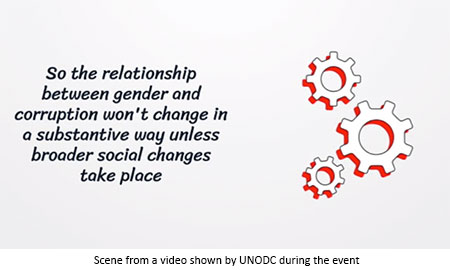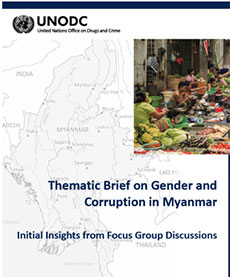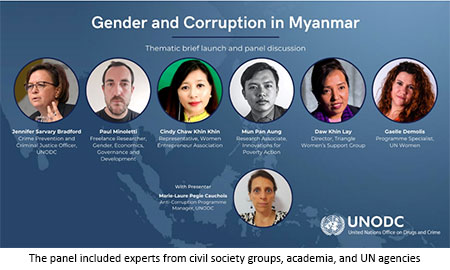
Yangon (Myanmar), 16 December 2020 - Women are more affected by corruption than men, with women for example paying more bribes than men to obtain public services. These and other findings are at the heart of a Thematic Brief on Gender and Corruption in Myanmar, presented by UNODC today as part of a panel discussion around the topic. Based on a series of focus group discussions organized across Myanmar in 2019, the brief explores gender as a factor in how corruption is perceived and experienced.  “It is more often the women who attend parent meetings at school. Teachers can discuss freely and ask for bribes more easily if only women attend. If men were going, too, teachers would be less likely to ask for a bribe,” said a female participant in one of the focus group discussions, reflecting upon the higher likelihood of women being expected to pay bribes for basic services, such as health or education for their children. Sextortion, which forces victims to exchange sexual favors for access to services also emerged as a bleak reality normally faced by women rather than men.
“It is more often the women who attend parent meetings at school. Teachers can discuss freely and ask for bribes more easily if only women attend. If men were going, too, teachers would be less likely to ask for a bribe,” said a female participant in one of the focus group discussions, reflecting upon the higher likelihood of women being expected to pay bribes for basic services, such as health or education for their children. Sextortion, which forces victims to exchange sexual favors for access to services also emerged as a bleak reality normally faced by women rather than men.
In Myanmar, corruption is a major issue as highlighted by a survey conducted by Myanmar’s Anti-Corruption Commission (ACC), in which 90% of the respondents have claimed to paying bribes when interacting with government officials. The Thematic Brief’s findings suggest that corruption is also a significant barrier to gender equality, affecting the availability of basic public services and central parts of life such as education and healthcare. Driving a narrative that women are more submissive when asked for bribes, it also perpetuates gender stereotypes and threatens womens’ dignity and physical safety. “The statistics clearly show the need for continued efforts to address corruption,” said Benedikt Hofmann, UNODC Country Manager for Myanmar. “However, to be effective, responses need to factor in the disproportionate impact corruption has on certain parts of the population, like women.”
Noting the need for cross-cutting responses addressing both gender and corruption and the linkages between them, rather than viewing them in siloes, the Thematic Brief offers a set of short-, medium- and long-term recommendations around raising awareness and improving frameworks and capacities of Government and civil society to contribute to more gender-sensitive responses to corruption. Above all, however, the document is a call for more continued exploration and systematic research in a matter that is still not very well understood in Myanmar and beyond.
Many of these responses were taken up during the panel discussion which brought together six expert panelists from civil society and international organizations. Focusing on the need for increasing female engagement around questions of governance, gender and corruption, including in the private sector, as well as gender-sensitive reporting mechanisms and the role of civil society organisations (CSOs), the opinions shared are important contributions to a debate gaining increasing traction in Myanmar. “A lot of progress has been achieved in Myanmar towards gender equality and in the fight against corruption, and yet there is a lot more to be done.” Marie Pegie Cauchois, UNODC Anti-Corruption Programme Manager said about the event, “This panel discussion is a perfect opportunity for us to get together and propose solutions which will lead to progress in both areas by enabling truly gender-responsive corruption measures.”
The Thematic Brief on gender and corruption is part of UNODC's broader efforts to support Myanmar in addressing corruption under the UNODC Myanmar Country Programme which aims to more effectively prevent, raise awareness of, detect, investigate and prosecute corruption. UNODC’s activities include support to legislative and regulatory reform, assistance to collect data for an evidence-based approach on corruption, capacity building for investigation and prevention of corruption, pro-active engagement of youth on integrity issues and strengthening accountability and capacity to address corruption within government ministries through Corruption Prevention Units. Supported by Sweden as well as Denmark, Norway and the Siemens Integrity Initiative, the programme also promotes resilience in key sectors through targeted anti-corruption risk assessments. The Thematic Brief also directly contributes to Myanmar’s efforts towards achieving the Sustainable Development Goals (SDGs) of the 2030 Agenda for Sustainable Development, especially SDG 5 on Gender Equality, and SDG 16 on Peace, Justice and Strong Institutions.
The thematic brief can be found here: English, Myanmar.
And for more - the UNODC publication The Time is Now – Addressing the Gender Dimensions of Corruption.